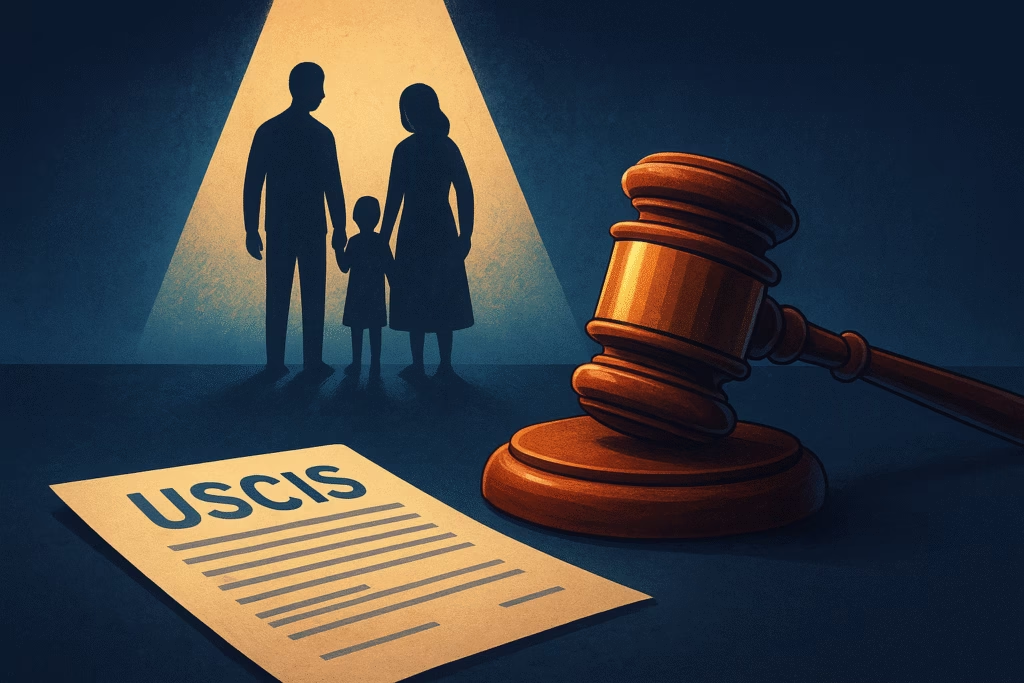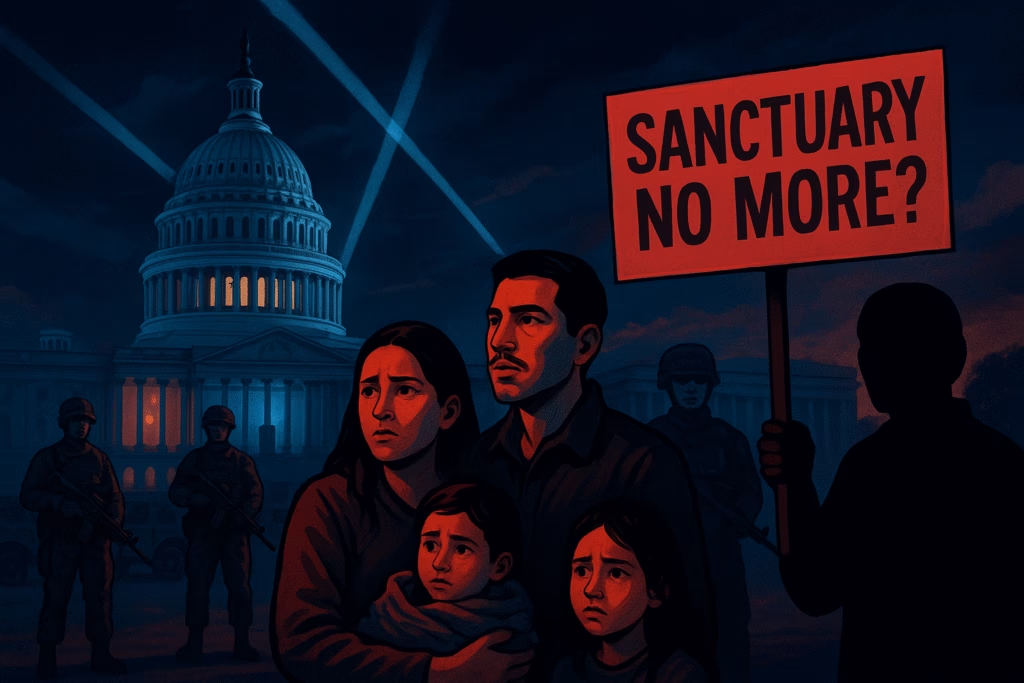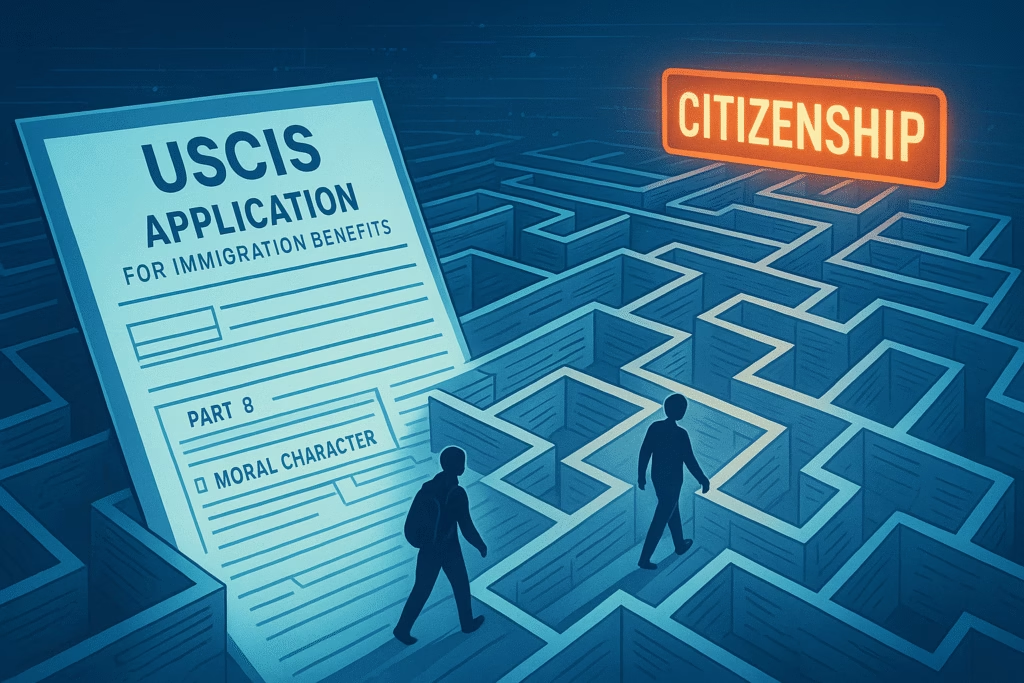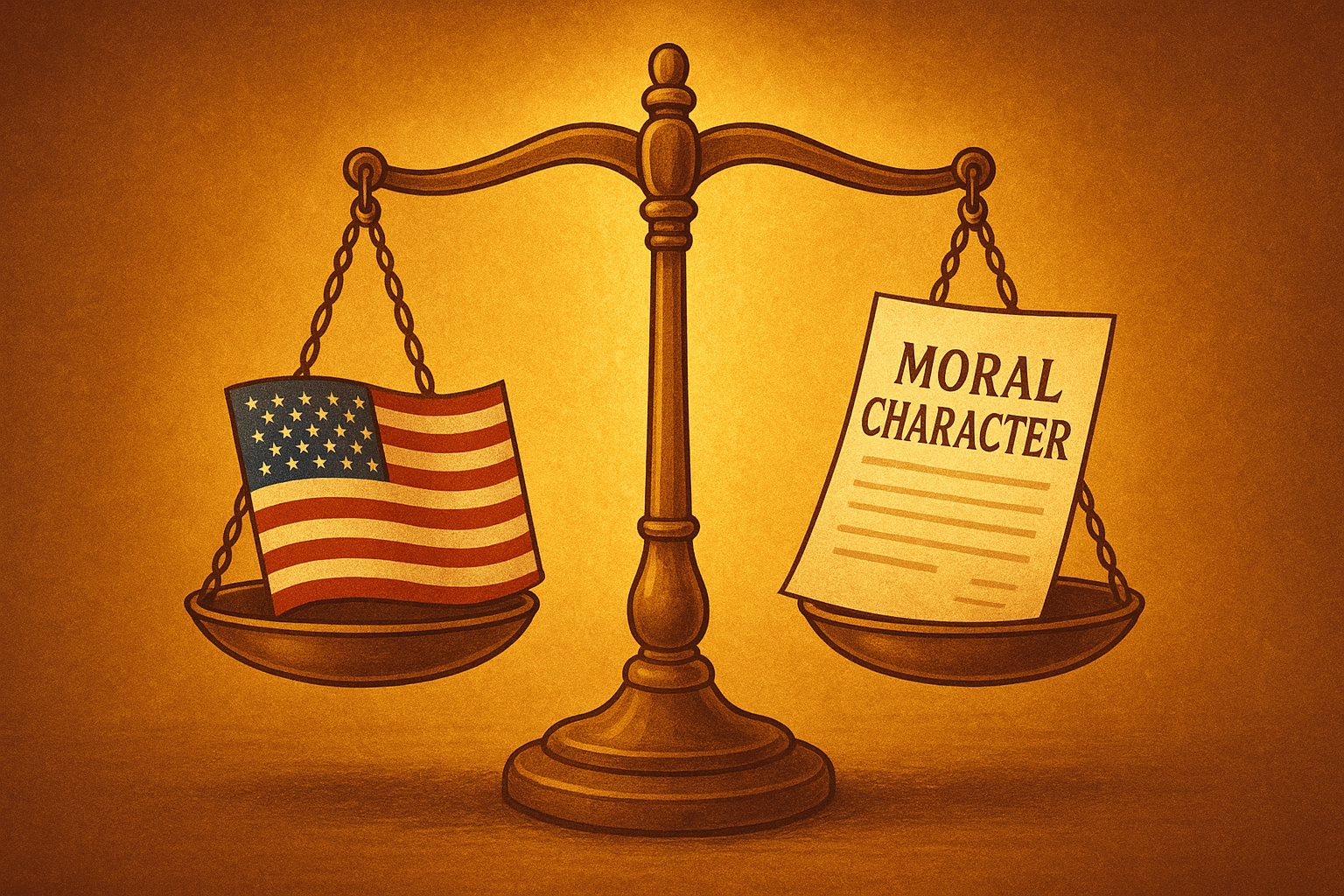Table of Contents
Introduction
Washington, DC, is undergoing a significant policy change that mirrors a larger national trend. There is a federal push to reshape immigration enforcement and citizenship eligibility. The deployment of National Guard troops in the capital and the increased scrutiny by USCIS regarding “good moral character” are key elements of this change. These developments are fundamentally altering the relationship between immigrant communities, local authorities, and federal power.
Historical Context: USCIS
Immigration and crime debates in the U.S. have deep roots. Sanctuary city policies started in the 1980s to protect immigrant communities from federal overreach. Over the years, these policies let local law enforcement focus on community safety instead of acting as immigration agents.
However, the period after 9/11 saw more federal involvement in local policing. Programs like Secure Communities and 287(g) mixed local and federal responsibilities. The recent federal directive in Washington, DC represents the most aggressive version of that trend by using federal authority to completely override local policies.
Likewise, citizenship naturalization standards have always required applicants to show “good moral character,” but this historically focused on serious crimes and fraud. The 2025 USCIS memo now broadens that scope, making everyday infractions important for naturalization eligibility. These historical changes explain why immigrant communities feel more targeted than ever before.
Economic Implications: Workforce and Business Impact
Immigrant workers are vital to the DC economy, covering sectors like construction, hospitality, and healthcare. Increased arrests and the fear of deportation may cause labor shortages, higher business costs, and disruptions in essential services.
On a national scale, stricter checks on citizenship could discourage lawful permanent residents from applying. This change might lead to fewer newly naturalized citizens joining the workforce or voting population. Experts warn that this could have lasting effects on demographics and the economy, decreasing entrepreneurship rates among immigrants. Historically, this has been one of their strongest contributions to the U.S. economy.
Legal Aid and Community Resources: What Can Immigrants Do?

Given these changes, immigrant advocates stress the need for preparation and education. Key steps include:
- Know Your Rights. Understand when you need to disclose your immigration status to law enforcement.
- Legal Representation. Talk to immigration attorneys for citizenship applications and defense against removal.
- Document Positive Contributions. Keep records of taxes paid, community service, and caregiving roles to help balance out minor violations.
- Avoid Legal Pitfalls. Address even minor offenses, such as unpaid traffic tickets, quickly to prevent negative findings about your moral character.
Organizations like CASA, AILA (American Immigration Lawyers Association), and local nonprofits are available for support. are ramping up outreach programs to help communities navigate the changing landscape.
Political Ramifications Beyond DC: USCIS
The policy changes in DC and USCIS are a test for the rest of the nation. If the federal government can keep control over local policing in DC, similar actions could spread to other sanctuary cities like New York, Los Angeles, and Chicago.
On the citizenship front, stricter reviews of good moral character may become a political topic in the 2025 election cycle. Both parties aim to appeal to immigrant voters and moderates concerned about law and order. Federal immigration policy has always changed with different administrations, but the scale of this enforcement increase suggests a new level of federal involvement.
DC’s Sanctuary Traditions Upended by Federal Takeover

For decades, Washington, DC, followed sanctuary city principles that limited cooperation between local police and immigration authorities. This changed suddenly on August 7th when a federal directive required the Metropolitan Police Department (MPD) to work with immigration officials. More than 380 arrests have already occurred, with nearly 40% involving undocumented immigrants. Over 1,100 National Guard troops from GOP-led states are now present in the city.
This sudden rise shows how federal enforcement is being used for both crime control and immigration control. The directive allows MPD officers to inform ICE during routine stops and help transport detainees. These policies were unthinkable under the city’s previous sanctuary framework. These changes indicate a broader federal effort to monitor immigrant communities, not just in DC but across the country.
Fear and Legal Tension in Immigrant Communities

Concern over the rise in anxiety among immigrant families has been expressed by community organizations like CASA. Many worry that the enforcement campaign is targeting individuals based on their illegal status instead of focusing on real criminal behavior. This situation mirrors the growing emphasis on “good moral character” by USCIS. Now, even minor offenses such as unpaid traffic tickets or DUIs can make someone ineligible for citizenship.
A common factor in the changes to the citizenship policy and street-level enforcement in DC is the increase in federal scrutiny of immigrants’ actions. There is a chilling effect when non-criminal actions are increasingly viewed as signs of moral character or threats to public safety. Legal aid organizations are working quickly to provide help while warning families about the importance of being prepared and compliant.
Crime Rates Versus Federal Narrative
Critics highlight a clear gap between crime trends in DC and the federal response. Violent crime is close to a 30-year low. However, President Trump insists that the crackdown is making the city safer. A similar political narrative shapes the USCIS memo that expands moral character reviews. It frames immigration as a law-and-order issue, even when the data suggests otherwise.
This gap between reality and perception influences national discussions. Is the rise in monitoring and enforcement truly about safety, or is it politically motivated? In the 2025 election cycle, voters’ views on immigration, crime, and federal power are being shaped by the federal takeover of DC and the extra discretion given to USCIS.
Local Capacity and Federal Leverage
Mayor Muriel Bowser’s request for 500 more MPD officers highlights another problem. Local law enforcement resources are stretched thin. The deployment of the National Guard temporarily addresses this issue, but it reduces local control. In a similar vein, USCIS’s broader moral character assessments lead to longer case processing times, forcing applicants to prepare more thoroughly.
In both situations, federal influence determines the results. Sanctuary jurisdictions may lose federal funds if they do not cooperate with immigration enforcement. Citizenship applicants face denial if they cannot demonstrate moral character based on heightened standards. The federal government’s influence is changing local and personal dynamics.
Holistic Scrutiny: From City Streets to Citizenship Interviews
The USCIS policy memo released on August 15 reflects the same thinking behind DC’s enforcement increase. It calls for a thorough evaluation of behavior. Just as the MPD must now collaborate with federal agents, citizenship applicants must share their entire life story for review.
Immigration officers are directed to look past serious crimes. They will consider unpaid taxes, traffic violations, and personal habits. At the same time, they can also take into account positive actions, like caregiving or volunteering. This two-sided approach creates uncertainty; immigrants will face more scrutiny, but they also have chances to address past mistakes by providing proof of rehabilitation.
Legal Pushback and Election
A judge has temporarily blocked a full federal takeover of MPD and has kept some local control. Sanctuary cities across the country are getting ready for similar legal fights as DOJ deadlines approach. At the same time, immigration lawyers are advising citizenship applicants not to wait but to prepare thoroughly with legal help because of the increased scrutiny.
These events show that immigration enforcement and citizenship policy are now key issues in national politics. Republicans highlight crime and immigration control while progressives caution against ignoring voters’ concerns. Both DC’s enforcement increase and USCIS’s moral character memo demonstrate how these topics will shape the election conversation.
Conclusion
The federal enforcement increase in DC and the heightened USCIS review of moral character are closely related. They indicate a shift towards more federal involvement in immigration and crime policy. These changes have a daily impact on undocumented immigrants at risk of arrest, lawful residents seeking citizenship, and local governments struggling to maintain their independence.
The main point is preparation and awareness. Communities need to adjust to the rise in enforcement. Applicants should highlight their positive contributions. Policymakers face the challenge of finding the right balance between safety, civil rights, and political concerns. As the situation in DC progresses and USCIS rolls out its memo nationwide, one thing is clear: immigration policy has entered a new phase where federal oversight is greater than ever before.
Discover more from NewsBusters
Subscribe to get the latest posts sent to your email.

1 thought on “Federal Enforcement Surge and Stricter Citizenship Rules: A New Era for Immigration and Crime Policy”